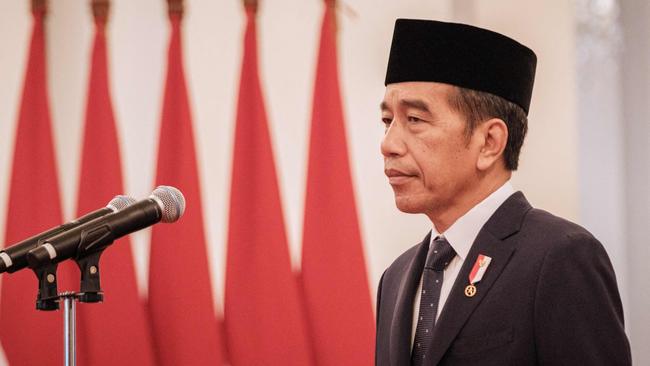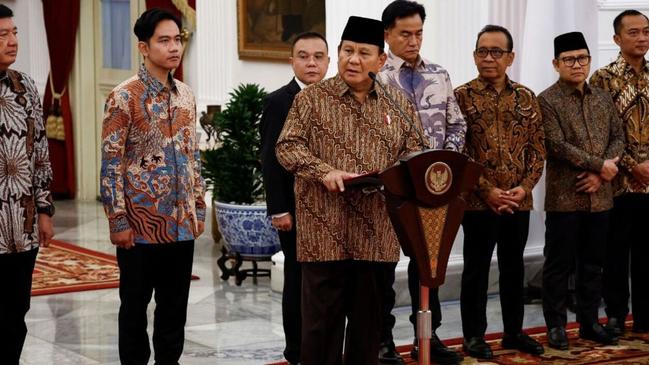Indonesian former president Joko Widodo ‘among world’s most corrupt leaders’
Joko Widodo claims he has been slandered after he was put on a list alongside African leaders and the ousted Syrian president by an international journalism organisation.

Former Indonesian president Joko Widodo claims he has been slandered after he was nominated by an international journalism organisation as one of the most corrupt leaders in the world, alongside several African leaders and the ousted Syrian president.
Indonesia’s seventh president, widely known as Jokowi, queried whether the Organised Crime and Corruption Reporting Project (OCCRP) had any evidence of corruption during his 10 years in office. He was listed alongside other high-profile figures, including Kenya’s President William Ruto, Nigeria’s President Bola Ahmed Tinubu, former Bangladesh Prime Minister Sheikh Hasina, and Indian businessman Gautam Adani, while ousted Syrian president Bashar al-Assad took the “person of the year” as the most corrupt.
“Most corrupt? What is corrupt? What has been corrupted?” Jokowi said in his residence in Solo, Central Java, when asked by journalists about the recent announcement.
He insisted that the nomination was a smear campaign against him. “Right now, there’s a lot of slander, a lot of malicious framing, a lot of accusations without evidence. That’s what’s happening now?” he said.
Jokowi suggested the nomination was just part of attacks from his political opponents, saying: “People can use anything as a vehicle, they can use the NGOs, they can use political parties. They can use mass organisations to accuse, to create malicious framing, to make these kinds of evil accusations.”

The former president has been consistently attacked by his former political party the Indonesian Democratic Party of Struggle (PDIP) since he endorsed Prabowo Subianto, who ran with his eldest son Gibran Rakabuming Raka. Mr Gibran’s own nomination was also only made possible after a controversial ruling by the constitutional court to reduce the allowable age of presidential and vice presidential candidates from 40 to 35 years old.
Jokowi’s administration was also known for allowing for the weakening of the Corruption Eradication Commission after he was re-elected in 2019.
PDIP politician Djarot Saiful Hidayat said while currently there were no actual corruption cases linked directly to Jokowi, the level of corruption in the country was higher in the past few years.
“This serves as feedback for all of us. To be honest, corruption cases in Indonesia over the last five years have been extraordinary,” he told reporters.
Jokowi’s supporter group Projo was also quick to defend the former president, saying the OCCRP’s assessment was flawed and lacked a clear basis.

“The level of public trust in Mr. Jokowi remains high to this day. Why should the opinions of the Indonesian people be disregarded like this?” Projo secretary Handoko said in a statement.
Jokowi left office in October with an approval rating of 75 per cent, down from 80 per cent a few months before.
Another Jokowi supporter, Haidar Alwi, argued that the OCCRP’s methodology was weak because there was no court ruling convicting Jokowi of any corruption.
“Proof of crimes or legal violations should be through a trial in court, not through polling or surveys,” he said.
In its official X account, OCCRP said while it invites nominations for the “Person of the Year in Crime and Corruption” award, the nomination process involves judges who weigh the scale and impact of their actions globally.
“But nominations aren’t votes. Our judges review all nominations, but the final decision belongs to the judges. It’s not an unpopularity contest,” the organisation said on Wednesday in response to surging votes for Kenyan President William Ruto.
This year, the OCCRP judges selected Bashar al-Assad as the most corrupt person of 2024, citing the long-lasting cross-border devastation caused by his regime in the Middle East.



To join the conversation, please log in. Don't have an account? Register
Join the conversation, you are commenting as Logout